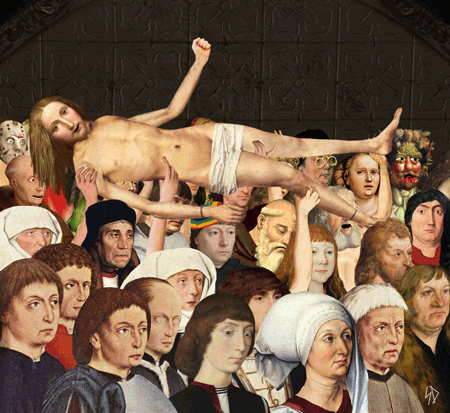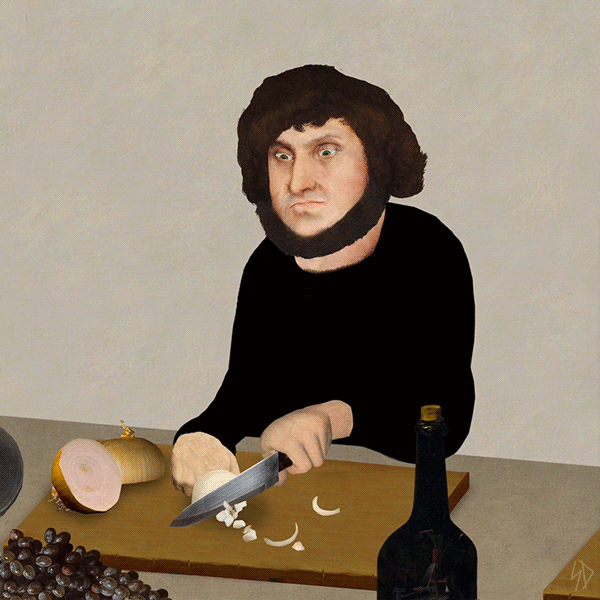Scorpion Dagger: a joke that keeps on going
Over a decade ago, Canadian digital artist James Kerr was working in construction. The settings called for tough nicknames. Kerr’s choice — not exactly appreciated by the rest — was Scorpion Dagger Ferrari Car. He kept trying to make his buddies use it, and when he later needed a title for a new project, a gif-a-day experiment, he came back to this joke, to keep it going. It has been going on ever since.
Kerr remembers himself as someone who was always painting (though he admits he wasn’t very good) and making collages. His mother was an artist, so he grew up in a creative environment, with a brief moment of “rebellion” that led him to study political science rather than art. He later joined a group of friends called the Young Peoples Foundation, and eventually decided to embark on an experiment: making one gif every day for at least a year and posting them on Tumblr. The first two gifs were based on physical collages that he photographed and animated. By the third, it became clear he wouldn’t be able to keep up the pace this way, so he turned to digital sources. Careful about copyright, he first mined the Library of Congress, and then discovered the Metropolitan Museum’s archive, which provides images for unrestricted use.
He was never interested in simply animating an existing painting; instead, he treated the works sourced from the Met as “palette”. He might take a small element — an eye, a hand, a cloud — something that faintly recalls its origin, but the characters and landscapes he builds are entirely his own. They do not appear in any painting. “I’ll be cutting out textures and assembling an object from them, like a car,” he says. The process shaped his colour palette too,and the result became the unmistakable Scorpion Dagger style: Renaissance figures in their original outfits, suddenly burdened with very contemporary anxieties. His characters search for porn online, vape, rave, work out — all the mundane rituals of contemporary life that, when placed within the world of the old masters, become hilariously absurd.
And it’s an interesting move, because so much of our lives — or at least our art — still unfolds within a visual framework inherited from the Renaissance, that enduring departure point for the idea of human artistic genius. Its colours, figures, poses and symbols are so familiar that they sit quietly in our collective memory, even for people who never studied art history.
Meanwhile, the internet is the filter through which we perceive almost everything nowadays: how information reaches us, how images circulate, how culture is absorbed. It is equally omnipresent, equally unconscious.
Kerr brings these two impulses together. The Renaissance gives his work a backbone of artistic certainty; the internet gives it its jittery, chaotic pulse.
It would be easy to frame Scorpion Dagger’s practice as a classic clash between low-brow and high-brow art — Renaissance solemnity meeting the chaos of internet culture — but Kerr shows that the divide is largely artificial in the era when everything from porn fails to old master paintings appears side by side on our social media feeds. Any image, even a so-called “poor image,” can be elevated to art, and any piece of fine-art imagery can slip into pop culture — as the old masters arguably already have. By letting Renaissance figures enact the ordinary, messy habits of digital life, Kerr reveals the strange harmony between the enduring canon of the past and the frantic vernacular of the present, proving that even the most established traditions can be recharged with a cut-and-paste and a perfectly looping joke.
Explore Scorpion Dagger’s work on Objkt




